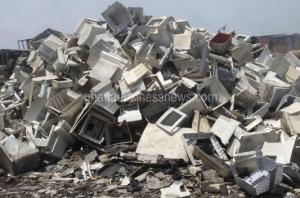UN-led meeting sets priority actions for e-waste management in Africa

Priority actions for reducing the environmental and health impacts of growing levels of electrical and electronic waste (e-waste), alongside promoting the sector’s potential for green jobs and economic development, have been agreed by representatives from 18 African states, the United Nations, non-governmental organizations, the private sector and academia.
The actions were agreed on the final day of the just-ended Pan-African Forum on E-Waste held in the Kenyan capital Nairobi, a statement from the United Nations Environment Programme (UNEP) said.
Organized by the Secretariat of the Basel Convention and UNEP, with support from the Government of Kenya, the forum was the first event of its kind on the continent.
It focused on long-term solutions to the rising levels of obsolete mobile phones, refrigerators, televisions and other e-products in Africa.
Increasing domestic consumption of electronic products, coupled with the ongoing import of waste electronics into Africa from other regions, means that the continent is set to generate a higher volume of e-waste than Europe by 2017.
According to the UNEP, the e-waste forum adopted a ‘Call to Action’, which outlines eight priority areas to improve the environmentally-sound management of e-waste in Africa.
These include:
· Implementation and enforcement by African states of the Basel Convention on the Control of Transboundary Movements of Hazardous Wastes and their Disposal and the Bamako Convention, which bans the import of hazardous wastes into Africa
· Development of national systems to improve the collection, recycling, transport, storage and disposal of e-waste
· National institutions to co-operate with multiple stakeholders (UN, NGOs, private sector and others) in producing e-waste assessments
· Recognition that the safe and sustainable recycling of e-waste provides an opportunity for green jobs and poverty reduction
· Awareness raising activities on environmental and health hazards linked to the unsound management of e-waste
As part of the ‘Call to Action’, manufacturers, importers, re-sellers and other handlers of electrical and electronic products should be required to organize the collection, recycling and recovery of e-waste, the UNEP statement indicated.
The UN Under-Secretary-General and UNEP Executive Director Achim Steiner said “Managing e-waste, and other kinds of waste, is essential for the transition to a low-carbon, resource-efficient Green Economy.”
“Sustainable management of e-waste can combat poverty and generate green jobs through recycling, collection and processing of e-waste – and safeguard the environment and human health from the hazards posed by rising levels of waste electronics,” added Mr. Steiner.
He highlighted that global recycling rates of some e-waste metals-known as rare earth metals-can be as low as one per cent despite these metals being crucial for components in hybrid electric car batteries to the magnets in wind turbines.
“The future of the clean tech, high-tech products and the transition to a Green Economy may in part depend on boosting the recycling of e-waste in order to assure a steady and streamlined supply of these specialty metals for these 21st century industries,” added Mr Steiner.
For the Executive Secretary of the Basel Convention, Katherina Kummer-Peiry, one tonne of obsolete mobile phones contains more ‘gold than one tonne of ore’ and the picture is similar for other precious substances.
“If you consider the value of these materials, then this represents an important economic opportunity. There are recyclers and other industrial sectors who are interested in taking advantage of such opportunities, which can in turn create green jobs and support sustainable development,” said Kummer-Peiry.
Delegates at the Pan-African E-waste Forum underlined the importance of improved access to Information and Communication Technology (ICT) in Africa towards achieving the United Nations Millennium Development Goals.
They also underlined the fact that recycling and recovery activities need to move from the unregulated, informal sector, where health and environmental risks are high, to a more regulated system using international recycling standards.
The forum agreed that Extended Producer Responsibility (EPR) should be a key component of the environmentally sound management of e-waste.
By Ekow Quandzie
